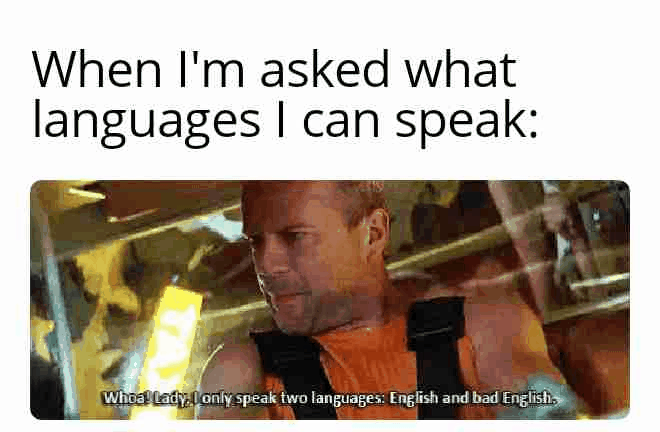Alternatively, in the languages I speak:
Welche Sprachen sprechen Sie? (Deutsch/German)
¿Qué idiomas habla usted? (Español/Spanish)
Quelle langue parlez-vous? (Français/French)
EDIT: These sentences are now up to date.
I only speak two languages: English and bad English.

Aw, I was gonna make that joke
French, English, German and a little spoken Japanese. I also studied latin
Edit: in French we say: « Quelles langues parlez-vous ? »
* Welche Sprache sprechen Sie?
Vee feel shpra her shprist doo, doo arsh lock
*Du… Benutzen wir Sie hier wirklich?
Was Sprachen Sie spricht?Welche Sprachen sprechen Sie? (Deutsch/German)Ah, danke.
/\ that’s the more formal way of addressing either a single person or multiple (yeah, this formal pronoun is a bit weird and can be read multiple ways). If you wanna address a group of people more informally: “Welche Sprachen sprecht ihr?”.
Baguette, dutch, english and spanish, i love to speak all 4 equally but french is the equivalent of a having a migraine to write
Bist du sicher, dass du deutsch sprichst?
Thats what I thought too when reading the German sentence xd
Ja, aber mein Deutsch ist nicht perfekt.
Hast du Deutsch studiert?
Ja, ich have studiert für ein lange Zeit.
Erste, im Schule an, dann später von mir selbst.
Ich kann spreche etwas Deutsch mit helfe von ein Übersetzer mag DeepL oder Microsoft.
English and ɥsolƃuƎ uɐᴉlɐɹʇsn∀
I’m able to speak German (native speaker) and English (fluent).
Also, as a German speaker, I’d like to correct the question in the post:
Formal would be “Welche Sprachen sprechen Sie?”.
More fitting for a casual environment (such as Lemmy) would be “Welche Sprachen sprecht Ihr?” though :)
This is, because in German there are formal and informal ways of addressing people, both with their distinctive pronouns. Usually, when talking to people you don’t know personally, you’ll address them formally and then, when offered to, switch to the informal style once you know them. Online or among the younger generation it is much more common to just use the informal case though.
English, Mandarin and fluent in C++
Into mixing different elixirs lately
I know enough Spanish to embarrass myself. I know enough of Nahuatl to understand some glyphs. I speak English at an American level, which is greasy.
你會哪些語言?(Traditional Chinese)
That’s about it. I am an interpreter and translator between English and Chinese.
Which Chinese language?
Mandarin. I can speak Taiwanese as well.
Greek, English, and I understand a bit of French, since my husband is French. I lived for 9 months in Germany too, and I could understand a bit of that too, but that was 30 years ago and I’ve forgotten most of it.
Truth is, I don’t really like verbal communication, in any language. I have trouble finding words (including my native one), it’s as if my brain is not optimized for language. It gets worse when I’m sick (I have multiple autoimmune issues), it’s as if language becomes a barrier. My husband becomes aggravated when I can’t find the right words to communicate. I wish we had telepathy, communicating with feelings.
English natively, but I also speak Spanish every day at work. I can read and write Latin. I can exchange pleasantries in half a dozen other languages.
Bueno!
Swedish, English and Spanish - in approximate order of proficiency.
Fluently? Only English. But I spent 20 years in the US military, nearly 8 of them living full-time in foreign countries. So I did my best to learn at least a little of the languages I was exposed to in my travels.
I was stationed in Japan for 3 years. I learned how to get around and order food in Japanese, plus some limited conversation. I’m actually studying to read the language now. I could read Hirigana and Katakana (the Japanese alphabets) when I lived there. But it takes their students their entire school lives to learn how to read Kanji (the complex Chinese-borrowed symbols that represent entire words), so that one will keep me busy for a while.
When I was stationed in Germany, I learned some basic German, thanks to having friendly neighbors who spoke nearly fluent English. They helped me correct and improve my German language skills. But I was only in the country for a couple years, so I didn’t get very advanced with it.
I took 4 years of French in high school. I thought I was pretty decent at it, but every time I attempted to speak the language in France, the locals immediately switched over to English to converse with me.
Random related tangent: my wife and I took a vacation to Berlin once, and my wife, like me, spent several years studying French in high school. She decided to test her German language skills with the locals, and when she spoke, they immediately switched to French for her. Turns out, she speaks German with a heavy French accent. She was able to finish her conversation in French.
I’m currently studying Norwegian. My 3x great grandfather immigrated to America from Norway, and I still have living descendants of my ancestors over there. My dad and I went to visit them once, and I would like to be able to speak their native language the next time I go back. It used to be a rule that everyone in my family line learned English and Norwegian, but my grandfather died when my dad was only 2, so my dad never learned Norwegian, and thus neither did I.
I learned some extremely limited Korean. I was assigned to South Korea twice, for a year each time, and the military wouldn’t let me live off-base amongst the locals, so I didn’t get much free time to explore the country and learn the language. But I made an effort to learn some phrases so I could be polite in public, order food, and find my way back to the military base if I got lost.
Other languages that I’ve been exposed to and picked up a handful of words/phrases, but never seriously attempted to study: Italian, Arabic, Spanish, and Hawaiian.








